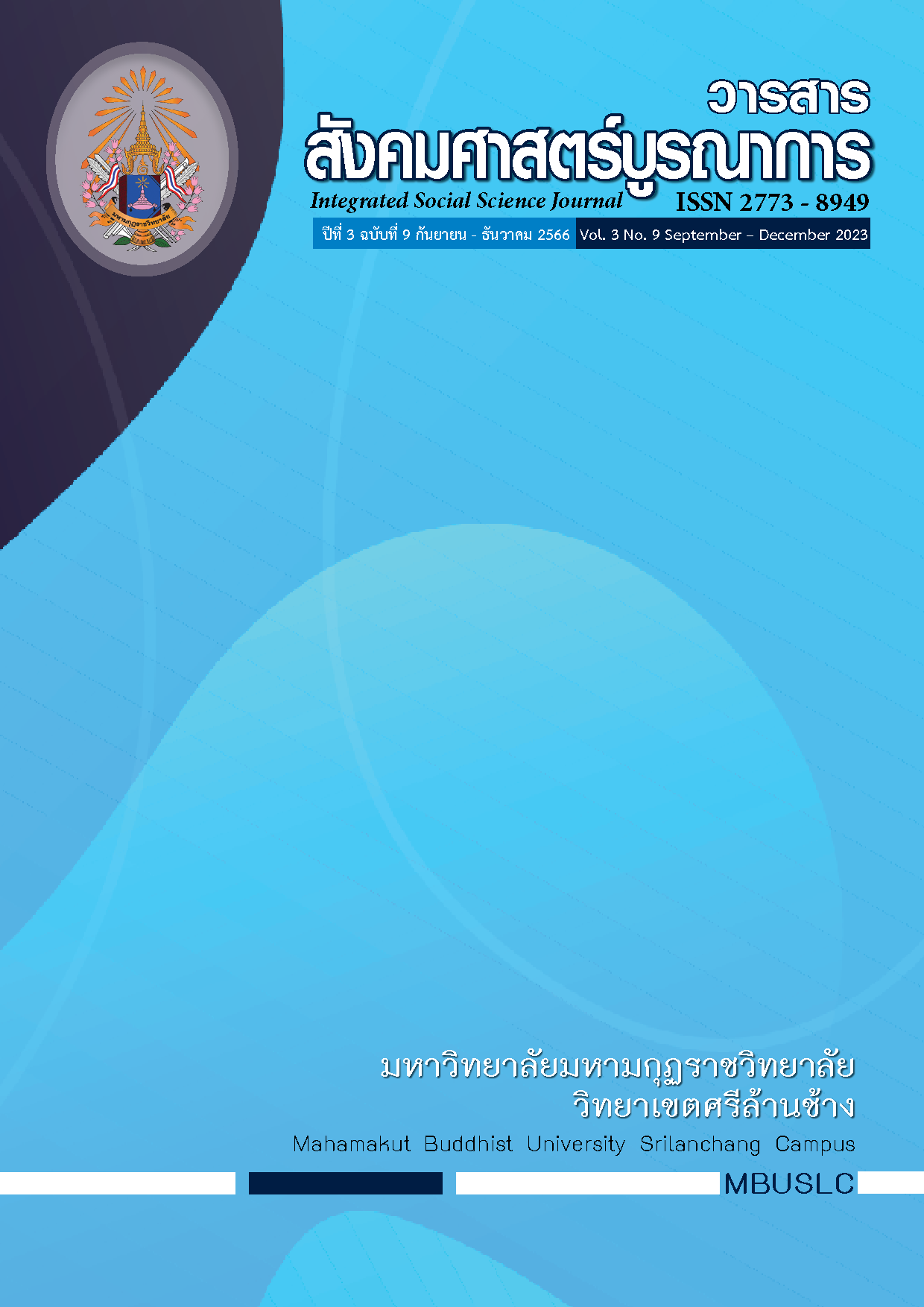THE GUIDELINES FOR DEVELOPING TRANSFORMATIONAL LEADERSHIP OF SCHOOL ADMINISTRATORS SECONDARY EDUCATION IN THE THAILAND 4.0 ERA UNDER THE SECONDARY EDUCATIONAL SERVICE AREA OFFICE LOEI NONG BUA LAMPHU
Main Article Content
Abstract
The objectives of the research were to study the current condition, the desired condition, the modified priority needs index, and the guidelines for developing transformational leadership of secondary school administrators in the Thailand 4.0 era under the Secondary Educational Service Area Office Loei Nong Bua Lamphu, to study and to evaluate the guidelines. The research study was divided into 3 phases. The first phase was to study the current condition, the desired condition, and the modified priority needs index, and it had two steps; the first step of the survey study by collecting the quantitative data from the sample group of 329 school administrators and teachers, selected by Krejcie and Morgan sample size calculating table, including the stratified random sampling, and the second step on collecting the qualitative data from the target group of three school administrators and teachers with the in-depth interview. The second phase was to study the guidelines by collecting the data from ten experts with the focus group discussion. The third third phase was an evaluation of the guidelines by five experts. The research instrument comprised the rating scale questionnaire, the semi-structured interview, the focus group discussion, and the connoisseurship. The statistics used for data analysis comprised frequency distribution, arithmetic mean, and standard deviation. The descriptive analytics was utilized to analyze the qualitative data. The research finding revealed that the current condition of development of transformational leadership of secondary school administrators in the Thailand 4.0 era under the Secondary Educational Service Area Office Loei Nong Bua Lamphu was totally and individually found to be at a high level (x̅ = 3.37, S.D. = 0.67), the desired condition was totally found at the highest level (x̅ = 4.91, S.D. = 0.33), and the modified priority needs index (PNImodified) = 0.46). The other finding disclosed that the guidelines for developing transformational leadership for secondary school administrators in the Thailand 4.0 era consisted of five elements; 1. Idealised Influence (II), endowed with three operational methods, three activities/projects, and four practices, 2. Inspirational Motivation (IM), endowed with three operational methods, three activities/projects, and four practices, 3. Intellectual Stimulation (IS), endowed with three operational methods, three activities/projects, and four practices, 4. Individualised Consideration (IC), endowed with three operational methods, three activities/projects, and four practices, and 5) Media and Technology Leadership, endowed with three operational methods, three activities/projects, and four practices. 3. Another finding was the evaluation of the guidelines for developing transformational leadership of secondary school administrators in the Thailand 4.0 era. That was, the appropriateness was totally at the first highest level (x̅ = 4.89, S.D. = 0.33), followed by usefulness (x̅ = 4.87, S.D. = 0.34), and the feasibility was found at the lowest level (x̅ = 4.57, S.D. = 0.77).
Article Details

This work is licensed under a Creative Commons Attribution-NonCommercial-NoDerivatives 4.0 International License.
บทความที่ได้รับการพิจารณาจากคณะกรรมการผู้ทรงคุณวุฒิและเผยแผ่ในวารสารฉบับนี้ เป็นทัศนคติและข้อคิดเห็นส่วนบุคคลของผู้เขียนแต่ละท่าน ไม่ถือว่าเป็นทัศนะคติและความรับผิดชอบ
ของบรรณาธิการ
บทความ ข้อมูล เนื้อหา รูปภาพ ฯลฯ ที่ได้รับการตีพิมพ์ในวารสารสังคมศาสตร์บูรณาการ ถือเป็นลิขสิทธิ์ของวารสารสังคมศาสตร์บูรณาการ หากบุคคลหรือหน่วยงานใดต้องการนำทั้งหมดหรือส่วนหนึ่งส่วนใดไปเผยแพร่ต่อหรือเพื่อกระทำการใด ๆ จะต้องได้รับอนุญาตเป็นลายลักอักษรจากวารสารสังคมศาสตร์บูรณาการ ก่อนเท่านั้น
References
กมลมาลย์ ไชยศิริธัญญา. (2559) ภาวะผู้นำการเปลี่ยนแปลงของผู้บริหารที่ส่งผลต่อสมรรถนะหลักของครูใน โรงเรียนสังกัดสำนักงานเขตพื้นที่การศึกษามัธยมศึกษา เขต 2. วารสารมหาวิทยาลัยศิลปากรมนุษยศาสตร์ สังคมศาสตร์ และศิลปะ. 9(2). 1510 – 1525.
จุฑาทิพย์ สุจริตกุล. (2562). ภาวะผู้นำการเปลี่ยนแปลงของผู้บริหารองค์กรปกครองส่วนท้องถิ่นในยุค ประเทศไทย 4.0 กรณีศึกษา: องค์กรปกครองส่วนท้องถิ่น จังหวัดภูเก็ต. วารสารมหาจุฬานาคร
ทรรศน์. 6(10)
ชีวิน อ่อนละออ. (2553). การพัฒนาตัวบ่งชี้ภาวะผู้นำการเปลี่ยนแปลงของผู้บริหารมหาวิทยาลัยเอกชนในประเทศไทย. วิทยานิพนธ์ ศษ.ด. (การบริหารการศึกษา). ขอนแก่น: บัณฑิตวิทยาลัย มหาวิทยาลัยขอนแก่น
ภารดี อนันต์นาวี. (2551). หลักการ แนวคิด ทฤษฎีทางการบริหารการศึกษา. กรุงเทพฯ: บริษัท สำนักพิมพ์มนตรี จำกัด
พนัชกร พองาม. (2558). ภาวะผู้นำการเปลี่ยนแปลงของผู้บริหารสถานศึกษา: กรณีศึกษาโรงเรียนบ้านหมอพัฒนานุกุล. วิทยานิพนธ์ กษ.ม. (การบริหารการศึกษา). นครปฐม: ภาควิชาการบริหารการศึกษา บัณฑิตวิทยาลัย มหาวิทยาลัยศิลปากร
พิชาย รัตนดิลก ณ ภูเก็ต. (2550). ภาวะผู้นำและแนวทางเชิงปฏิบัติสำหรับผู้บริหารส่วนท้องถิ่นภายใต้บริบทแห่งการเปลี่ยนแปลง. วารสารการพัฒนาท้องถิ่น. 2(1). 121 – 148.
วันเพ็ญ โสมมา. (2561). ภาวะผู้นำการเปลี่ยนแปลงของผู้บริหารสถานศึกษา สังกัดสำนักงานเขตพื้นที่การศึกษามัธยมศึกษา เขต 28. วิทยานิพนธ์ ค.ม. (การบริหารการศึกษา). ศรีสะเกษ: บัณฑิตวิทยาลัย มหาวิทยาลัยราชภัฏศรีสะเกษ
วิโรจน์ สารรัตนะ. (2544). โรงเรียนองค์การแห่งการเรียนรู้ กรอบแนวคิดเชิงทฤษฎีทางการบริหารการศึกษา. กรุงเทพฯ: ห้างหุ้นส่วนจำกัด ทิพย์วิสุทธิ์
สำนักงานคณะกรรมการพัฒนาระบบราชการ. (2562). ระบบราชการ 4.0. สืบค้นเมื่อ 12 สิงหาคม 2562 แหล่งสืบค้น https://www2.opdc.go.th/uploads/files/2560/ ThaiGov4.0_2.pdf.
สุปัญญดา สุนทรนนทย์ และคณะ. (2558). ปัจจัยด้านภาวะผู้นำการเปลี่ยนแปลง กิจกรรมการพัฒนาทรัพยากรมนุษย์ และความพร้อมสำหรับการเปลี่ยนแปลงที่มีอิทธิพลต่อการปฏิบัติงานของบุคลากรในมหาวิทยาลัยในกำกับของรัฐในประเทศไทย. วารสารมหาวิทยาลัยราชภัฏมหาสารคาม คณะมนุษย์ศาตร์และสังคมศาสตร์. 9(2). 133-146.
สุภาวดี จิตติรัตนกุล. (2550). ภาวะผู้นำการเปลี่ยนแปลงกับประสิทธิผลการปฏิบัติงานของ นายกเทศมนตรี กรณีศึกษา เทศบาลเมืองพังงา อำเภอเมือง จังหวัดพังงา. วิทยานิพนธ์ รป.ม. (การปกครองท้องถิ่น). ขอนแก่น: บัณฑิตวิทยาลัย มหาวิทยาลัยขอนแก่น
Lee J. Cronbach. (1974). Essentials of Psychological Testing. 3rd Ed. New York: Harper and Row Publisher.
Likert, R. (1962). New Pattern of Management. New York: Mcgraw-Hill.
Robert V. Krejcie and Daryle w. Morgan. (1970). Determining Sample Size for Research Activities. Journal for Education and Psychological Measurement 3.

